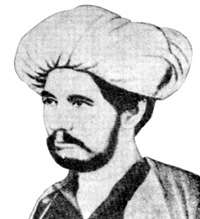Ubaidullah Al Ubaidi Suhrawardy
Ubaidullah Al Ubaidi Suhrawardy (1832–9 February 1885) was an educationist and writer.
Ubaidullah Al Ubaidi Suhrawardy | |
|---|---|
 | |
| Born | 1832 Chitwa, Midnapore District, Bengal Presidency, Company Raj |
| Died | 9 February 1885 (aged 52–53) Dhaka, Bengal Presidency, British India |
| Citizenship | |
| Alma mater | Calcutta Madrasa |
| Occupation | Professor |
| Organization | Mohammedan Literary Society, Central National Mohammedan Association, Bengal Social Science Association |
Notable work | Lubbul Arab Dastar-e-Farsi Amuz Miftahul Adab Mohammedan Education in Bengal and others |
| Children | 7 children including Abdullah Al-Mamun Suhrawardy (Son), Hassan Suhrawardy (Son), Khujastha Akhtar Banu (Daughter) |
| Relatives | Huseyn Shaheed Suhrawardy (Grandson)
Shaista Ikramullah (Granddaughter) Begum Badar un nissa Akhtar (Granddaughter) |
| Awards | Bahrul Ulm |
Early life
Ubaidullah was born on 1832 in Chitwa, Midnapore, Bengal Presidency, British India in the notable Suhrawardy family. He was educated in Arabic, English, and Persian at home. He graduated from Alia Madrassah, which was then located in Kolkata but moved to Dhaka following the partition of India, in 1857.[1]
Ubaidullah was a direct descendant of the Sufi mystic and saint Shaikh Shahabuddin Suhrawardy, who lived in Baghdad in the 12th Century. Shaikh Shahabuddin, was the author of what came to be regarded as the standard work on mysticism Awriful-Maariffi. He was a disciple and successor of Shaikh Abdul-Qadir Gilani, and the mosques and shrines over their tombs still survive in Baghdad and are places of pilgrimage to this day.
He was also a descendant of Shahab al-Din Suhrawardi.Ubaidullah's father was Shah Aminuddin Suhrawardy (the last Pir (Sufism) in the Suhrawardy family). He had two brothers both of whom were lawyers and subordinate judges (the highest rank available to Indians under British rule at the time). One of his brothers' was named Maulvi Mubarak Ali Suhrawardy alias Mohammad Ali.
[2]
Career
Ubaidullah first job was working as an aide to Prince Jalaluddin, the grandson of Tipu Sultan of Mysore, in Kolkata. After which he worked as the Scrivener at the Legislative Council, part of the office of the Viceroy of India. In 1865, he joined the Hooghly Mohsin College and taught Anglo-Arabic. One of his student was Syed Ameer Ali. In 1874, he was appointed the first superintendent of Dhaka Madrassah.
Ubaidullah was a follower of Nawab Abdul Latif and Sir Syed Ahmed Khan. He was affiliated with the Mohammedan Literary Society (1863), Central National Mohammedan Association (1877), Bengal Social Science Association and other organisations in Calcutta. He was also a member of the managing committee of the Muhammedan Anglo-Oriental College at Aligarh (1875).[1] He founded, in Dacca, two reformist and community development associations: Samaj Sammilani Sabha in 1879, and Mussalman Suhrid Sammilani (Mohhamedan Friends Association) in 1883.[3]
Ubaidullah wrote books in Urdu, Arabic, Persian and English and translated many works. Noted among his works are Grammar of Arabic Language, Urdu Diwan (Urdu poems, 1880), Farsi Dewan (Persian poems, 1886), Dastar-e-Parsi Amuz (Persian grammar), Lubbul Arab (Arabic grammar), Miftahul Adab (Urdu grammar), Dabistan-i-Danish Amuz (Urdu, physics), Dastar-e-Farsi Amuz (Persian, rhythm and rhetorics), Dastan-i-Ibratbar (Persian, autobiography). With the assistance of Syed Amir Ali, he rendered Makhaz-ul-Ulm by Syed Keramat Ali into English as a Treatise on the Sciences (1867) and Rammohun Roy's Tuhfatul Muwahedin into English in 1884. His Mohammedan Education in Bengal (1867) is an original work on education. He edited Guide (Urdu) and Durbeen (Persian). A number of his manuscripts on philology, psychology, women's education, in Urdu, still remain unpublished. He also understood basic Latin and Greek.[1]
The Indian government awarded him the title Bahrul Ulm (Sea of knowledge)for his contribution to education in India. The University of Dhaka awards the Bahrul Ulm Ubaidi Suhrawardy medal, which was named after him. Acharya Harinath De, as a tribute to him, created an oil painting of him.[1]
Death and legacy
Ubaidullah died in Dhaka, Bengal Presidency, British India, on 9 February 1885.[1] His son, Hassan Suhrawardy, was a noted politician in British India and his granddaughter, Shaista Suhrawardy Ikramullah, was a notable academic and diplomat of Pakistan.[4] His daughter, Khujasta Akhtar Banu, was a well known writer and poet.[5]
References
- Ahmed, Wakil (2012). "Suhrawardy, Ubaidullah Al Ubaidi". In Islam, Sirajul; Jamal, Ahmed A. (eds.). Banglapedia: National Encyclopedia of Bangladesh (Second ed.). Asiatic Society of Bangladesh.
- "Shah Aminuddin Suhrawardy". geni_family_tree. Retrieved 10 April 2020.
- Khan, Shahadat H. (2007). The Freedom of Intellect Movement (Buddhir Mukti Andolan) in Bengali Muslim Thought, 1926-1938. Edwin Mellen Press. ISBN 978-0-7734-5423-1.
- Srivastava, Gouri (2003). The Legend Makers: Some Eminent Muslim Women of India. Concept Publishing Company. p. 102. ISBN 978-81-8069-001-3.
- Islam, Sirajul (1992). History of Bangladesh, 1704-1971. Asiatic Society of Bangladesh. ISBN 978-984-512-337-2.